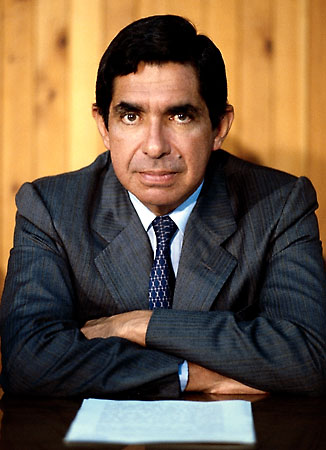<Back to Index>
- Physician Major Walter Reed, 1851
- Pianist and Composer Clara Josephine Wieck Schumann, 1819
- President of Costa Rica Óscar Rafael de Jesús Arias Sánchez, 1940



Óscar Rafael de Jesús Arias Sánchez (born 13 September 1940) is a Costa Rican politician who has been President of Costa Rica since 2006. He previously served as President from 1986 to 1990 and received the Nobel Peace Prize in 1987 for his efforts to end civil wars then raging in several other Central American countries.
He is also a recipient of the Albert Schweitzer Prize for Humanitarianism and a trustee of Economists for Peace and Security. In 2003, he was elected to the Board of Directors of the International Criminal Court's Trust Fund for Victims. He is a member of Collegium International, an organization of leaders with political, scientific, and ethical expertise whose goal is to provide new approaches in overcoming the obstacles in the way of a peaceful, socially just and economically sustainable world.
Raised by an upper class family in the province of Heredia, Óscar Arias concluded his secondary schooling at the Saint Francis College in the capital city of San José. He then went to the United States and enrolled in Boston University with the intention of studying medicine, but he soon returned to his home country and completed degrees in law and economics at the University of Costa Rica. In 1967, Arias traveled to the United Kingdom and enrolled in the London School of Economics. He received a doctoral degree in political science from the University of Essex in 1974. Arias has received over fifty honorary degrees, including doctorates from Harvard University, Princeton University, Dartmouth College, Oberlin College, Wake Forest University, Ithaca College and Washington University in St. Louis. Arias joined the National Liberation Party (PLN), Costa Rica's main social democratic party.
In 1986 he ran successfully for president on that party's ticket.
Arias's presidency saw the transformation of Costa Rica's economy from
one based on the traditional cash crops (coffee and bananas) to one more focused on non-traditional agriculture (e.g., of exotic flowers and fruits) and tourism. Some within the PLN criticized his administration for abandoning the party's social democratic teachings and promoting a neoliberal economic model. He is now often regarded as a neoliberal although he is a member of a nominally social democratic party. Arias
received the 1987 Nobel Peace Prize with the help of John Biehl, his
peer in England, and Rodrigo Madrigal Nieto for his work towards the
signing of the Esquipulas II Accords. This was a plan intended to promote democracy and peace on the Central American isthmus during a time of great turmoil: leftist guerrillas were fighting against the governments in El Salvador and Guatemala, which were backed by the United States under the auspices of the Cold War; the Contras, supported by the United States, were fighting an insurgency against the Sandinista government in Nicaragua; Honduras,
only recently wresting political power from its military, was caught in
the middle as a base for U.S. military forces; and on Costa Rica's
other border, Panama faced the oppression of Manuel Noriega's
military dictatorship. With the support of Arias, the various armed
conflicts ended within the decade (Guatemala's civil war finally ended
in 1996). Arias then called for a higher level of integration in the Central America region and promoted the creation of the Central American Parliament (Parlamento Centroamericano).
During his current administration, Arias has declared that Costa Rica
will not enter the Central American Parliament. Arias also modified the
country's educational system.
The most notable action in this respect was the reintroduction of
standardized academic tests at the end of primary and secondary school. In 2009, the Supreme Court of Honduras issued an arrest warrant on Manuel Zelaya because of violations of the constitution and laws. Two days later, the National Congress of Honduras (in which Zelaya's own party held 62 out of 128 seats, more than any other party), also voted to dismiss Zelaya. Zelaya was sent to Costa Rica. The Honduran constitution mandated that the head of Congress, Roberto Micheletti, who was next in the Presidential line of succession, becomes the provisional head of state since Vice President Elvin Ernesto Santos had
resigned in December 2008 to run for President. Micheletti’s term ended
27 January 2010. Arias began serving as mediator between Manuel Zelaya
and Roberto Micheletti in the 2009 Honduran constitutional crisis.
Representatives of the two Hondurans met with Arias on various
occasions but so far have failed to reach any kind of agreement. As
described above, Arias himself was initially
prohibited by Costa Rica's constitutional court from another term, due
to constitutional term limits,
but this was reversed using legal means, with the consent of the Costa
Rican Sala IV court, unlike in Honduras. New elections in Honduras are
planned for 29 November 2009. Micheletti's government stated on 2 July
2009 that it is willing to hold this year's presidential election
early. Costa Rican President, Oscar Arias, presented a seven point
agreement, which calls for the return of Zelaya as President - a
condition deemed unacceptable to the interim government. Zelaya's
representatives accepted the Arias proposal "in principle" but
Micheletti's representatives balked at the key point of Zelaya
returning to power in Honduras.
In August 2007, Arias was affected by tendinitis, and in April 2008 he canceled some activities because of muscular pain in his lumbar region. Subsequently, due to increasing difficulty in speaking over the course of several weeks, Arias went to the Philadelphia Ears, Nose and Throat Associates
medical center in the United States on 20 May 2008, where it was
determined that he had a nonmalignant cyst on his vocal cords. As a
result, it was announced on 21 May that doctors advised him not to
speak for one month, saying that if this did not help, surgery would be
considered. On 11 August 2009 Arias was diagnosed with H1N1 Influenza, but he overcame his disease.